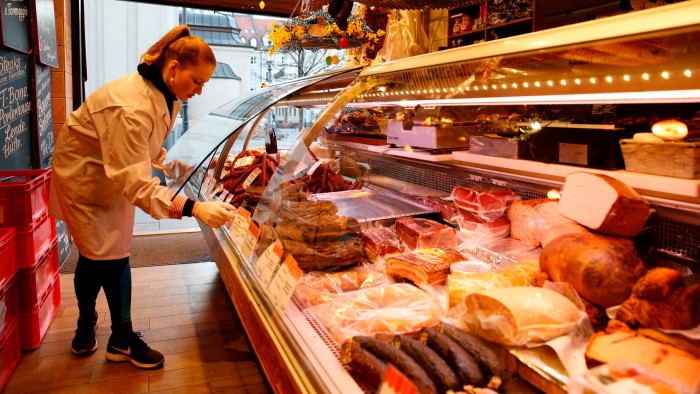Stay informed with free updates
Simply sign up to the German politics myFT Digest — delivered directly to your inbox.
Germany’s next agriculture minister has called for meat to be served at every school and kindergarten, in a symbol of the changing of the guard as Friedrich Merz prepares to become chancellor.
Alois Rainer, a butcher by training, will replace the vegetarian Green politician Cem Özdemir as the top official in charge of food and farming after Merz takes office on Tuesday next week.
Rainer, a member of the Bavarian sister party of Merz’s centre-right Christian Democrats (CDU), used an interview with the German tabloid Bild this week to call for cheaper meat prices and for meat to be included on menus for children.
“A balanced diet is important,” he said, adding that this applied especially to schools and kindergartens, where meat should be offered alongside vegetarian dishes.
His comments were met with glee by Markus Söder, the head of Rainer’s Christian Social Union (CSU) and a committed fan of the döner kebab, who made Green-bashing a personal hobby during the campaign for February’s nationwide elections.
“Instead of the Green-vegan Özdemir, the black butcher is now coming,” Söder said, in an apparent reference to the black logo of the CDU and CSU. The 59-year-old Özdemir is vegetarian, not vegan, having given up meat more than 20 years ago.
“This fits perfectly,” Söder added, saying that Germany could now look forward to more Leberkäse — a kind of meatloaf — instead of “Tofu-mania”.
The CDU-CSU will lead Germany’s next government after three-and-a-half years of the deeply unpopular three-way coalition headed by Social Democrat Olaf Scholz, who governed along with the Greens and the liberal Free Democrats.
The Greens, in particular, struggled to shake off a long-standing image as the “Verbotspartei” — the party of bans. Robert Habeck, the country’s outgoing vice-chancellor and the Greens’ lead candidate in February’s elections, suffered a blow to his popularity in 2023 after announcing plans for a phase out of new oil and gas heaters. He was later forced to heavily water down the idea.
All three of the parties from Scholz’s “traffic light” coalition were punished by voters, who turned instead to the CDU-CSU as well as to fringe parties including the far-right Alternative for Germany — whose co-leader Alice Weidel has repeatedly warned in the past: “Nobody goes near my schnitzel!”
The 69-year-old Merz and his CDU has promised to correct what they see as some of the worst excesses of the last government, which saw itself as progressive, taking steps to partially legalise cannabis, liberalise German citizenship rules and make it easier for people to legally change their gender.
The next government, which will see the SPD stay on as the junior partner, has said that it plans to cut what it sees as excessive regulation around sustainability reporting and supply chains. But the CDU-CSU was forced to drop manifesto pledges to fight the EU’s planned ban on the combustion engine and revive nuclear power in Germany as part of its coalition negotiations with the SPD.
Rainer, the incoming agriculture minister, angered environmental and animal welfare groups with his call for cheaper meat.
Anne Hamester, an expert on agriculture at Greenpeace, said that he was perpetuating myths with his argument. “Cheap meat is an expensive illusion,” she said. “We pay the true price with our health, environmental destruction, and the consequences of the climate crisis.”
Rainer’s predecessor, Özdemir, had followed the advice of a government-appointed agricultural commission — whose members included farmers’ groups — by calling for an extra levy on meat. He said that such a move would support farmers and promote higher welfare standards. Rainer said that meat prices should be up to the market, not politicians.
The future agriculture minister also drew fire for his call for more meat on school menus, with several critics arguing that it was more important to focus on reducing sugar and increasing access to fruit and vegetables. One columnist in the liberal Süddeutsche Zeitung accusing him of starting a culture war before even taking office.
Meat consumption in the home of Bratwurst and Blutwurst has declined in recent decades, although Germans still consume an average of about 1kg a week, according to government statistics.
The German Nutrition Society last year urged the public to reduce their consumption of meat and sausages to a weekly amount of 300g.
Sebastian Schaefer, a Green member of parliament, wrote on X that he was relieved that Rainer was a butcher by trade and not a winemaker or distiller, adding: “Otherwise there would be spritzers in the staff room and the little ones would be doing shots.”
